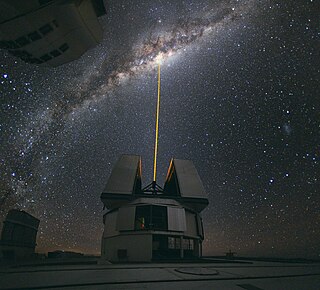
The multiverse is the hypothetical set of all universes. Together, these universes are presumed to comprise everything that exists: the entirety of space, time, matter, energy, information, and the physical laws and constants that describe them. The different universes within the multiverse are called "parallel universes", "flat universes", "other universes", "alternate universes", "multiple universes", "plane universes", "parent and child universes", "many universes", or "many worlds". One common assumption is that the multiverse is a "patchwork quilt of separate universes all bound by the same laws of physics."

Physics is the natural science of matter, involving the study of matter, its fundamental constituents, its motion and behavior through space and time, and the related entities of energy and force. Physics is one of the most fundamental scientific disciplines, with its main goal being to understand how the universe behaves. A scientist who specializes in the field of physics is called a physicist.
Physical science is a branch of natural science that studies non-living systems, in contrast to life science. It in turn has many branches, each referred to as a "physical science", together is called the "physical sciences".
The following outline is provided as an overview of and topical guide to physics:

The following outline is provided as an overview and topical guide to space science:

The cosmos is an alternative name for the universe or its nature or order. Usage of the word cosmos implies viewing the universe as a complex and orderly system or entity.

Natural science is one of the branches of science concerned with the description, understanding and prediction of natural phenomena, based on empirical evidence from observation and experimentation. Mechanisms such as peer review and repeatability of findings are used to try to ensure the validity of scientific advances.
This timeline of cosmological theories and discoveries is a chronological record of the development of humanity's understanding of the cosmos over the last two-plus millennia. Modern cosmological ideas follow the development of the scientific discipline of physical cosmology.

Max Erik Tegmark is a Swedish-American physicist, machine learning researcher and author. He is best known for his book Life 3.0 about what the world might look like as artificial intelligence continues to improve. Tegmark is a professor at the Massachusetts Institute of Technology and the president of the Future of Life Institute.

The Big Crunch is a hypothetical scenario for the ultimate fate of the universe, in which the expansion of the universe eventually reverses and the universe recollapses, ultimately causing the cosmic scale factor to reach zero, an event potentially followed by a reformation of the universe starting with another Big Bang. The vast majority of evidence indicates that this hypothesis is not correct. Instead, astronomical observations show that the expansion of the universe is accelerating rather than being slowed by gravity, suggesting that a Big Chill is more likely. However, some physicists have proposed that a "Big Crunch-style" event could result from a dark energy fluctuation.

An academic discipline or field of study is a branch of knowledge, taught and researched as part of higher education. A scholar's discipline is commonly defined by the university faculties and learned societies to which they belong and the academic journals in which they publish research.
Brian Thomas Swimme is a professor at the California Institute of Integral Studies, in San Francisco, where he teaches evolutionary cosmology to graduate students in the philosophy, cosmology, and consciousness program. He received his Ph.D. (1978) from the department of mathematics at the University of Oregon for work with Richard Barrar on singularity theory, with a dissertation titled Singularities in the N-Body Problem.

Ervin László is an American philosopher of science, systems theorist, integral theorist, originally a classical pianist. He is an advocate of the theory of quantum consciousness.

Mani Lal Bhaumik is an Indian American physicist and an internationally bestselling author, celebrated lecturer, entrepreneur and philanthropist.

Sean Michael Carroll is an American theoretical physicist and philosopher who specializes in quantum mechanics, cosmology, and philosophy of science. Formerly a research professor at the Walter Burke Institute for Theoretical Physics at the California Institute of Technology (Caltech) department of physics, he is currently an external professor at the Santa Fe Institute, and the Homewood Professor of Natural Philosophy at Johns Hopkins University. He has been a contributor to the physics blog Cosmic Variance, and has published in scientific journals such as Nature as well as other publications, including The New York Times, Sky & Telescope and New Scientist. He is known for his atheism, his vocal critique of theism and defense of naturalism. He is considered a prolific public speaker and science populariser. In 2007, Carroll was named NSF Distinguished Lecturer by the National Science Foundation.

Thanu Padmanabhan was an Indian theoretical physicist and cosmologist whose research spanned a wide variety of topics in gravitation, structure formation in the universe and quantum gravity. He published nearly 300 papers and reviews in international journals and ten books in these areas. He made several contributions related to the analysis and modelling of dark energy in the universe and the interpretation of gravity as an emergent phenomenon. He was a Distinguished Professor at the Inter-University Centre for Astronomy and Astrophysics (IUCAA) at Pune, India.

Galloping Coroners is a Hungarian original shamanic band active between 1975–2001, and since 2009. The band established a unique "shaman punk" or "psychedelic hardcore" sound, and is regarded as one of the most important alternative bands of the 1980s from the Eastern European bloc. Permanent restrictions by Hungarian authorities made worldwide tours difficult for the band, but its ecstatic concerts garnered surprising success across Western Europe. Though relatively obscure and commercially limited outside of Eastern Europe, Maximumrocknroll described the band as "equal in spirit and grit to faves like Sonic Youth or Big Black but with an identity all its own". VHK has been praised as a highly important band by Iggy Pop, Henry Rollins, Jello Biafra and Einstürzende Neubauten.
Shaman punk is a subgenre of punk rock and hardcore punk first used by critics to describe the musical style of Hungarian band Galloping Coroners in the 1980s.














